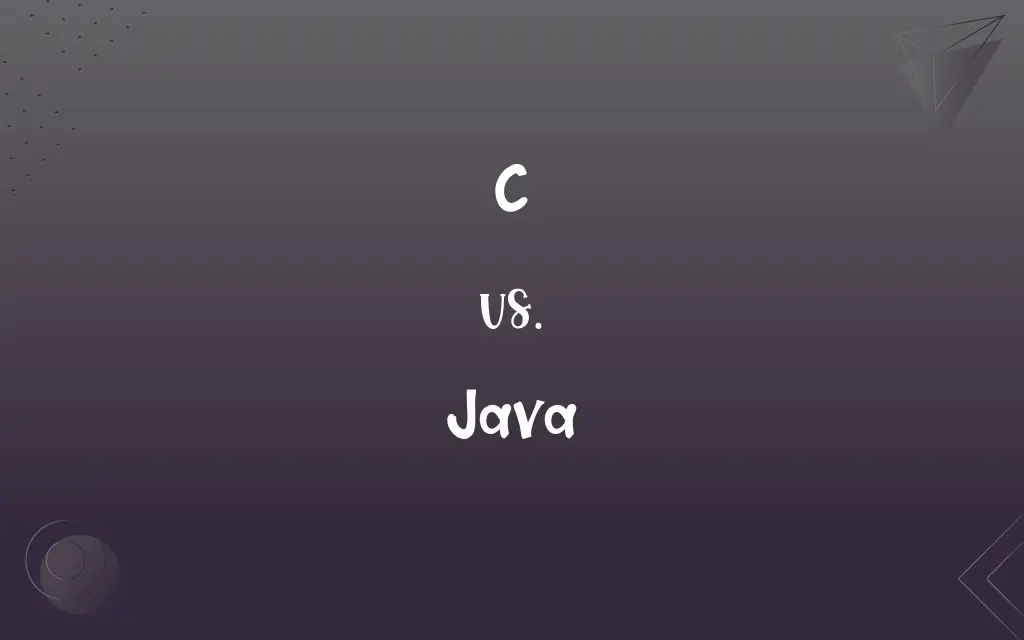C vs. Java: What's the Difference?
Edited by Janet White || By Harlon Moss || Updated on October 25, 2023
C is a procedural programming language, while Java is an object-oriented language that runs on the Java Virtual Machine (JVM).

Key Differences
C and Java are both influential programming languages, each with its own set of features and applications. C is a procedural language, emphasizing the sequence of operations, and has been foundational in computer programming since its development in the 1970s. Java, in contrast, is object-oriented, focusing on the objects and their interactions, and emerged in the mid-1990s with an intent to address the growing need for web and network applications.
When discussing platforms, C typically compiles to machine code specific for a target system, making it incredibly efficient and often used in system-level programming. Java adopts a different approach; it compiles to bytecode, which runs on the Java Virtual Machine (JVM), providing Java with the "write once, run anywhere" capability. This means Java applications can operate on any device with a JVM, fostering portability.
The memory management in C requires manual intervention, giving developers a lot of control but also making them responsible for memory allocation and deallocation. Java simplifies this by incorporating an automatic garbage collector that reclaims memory once objects are no longer in use. This difference showcases the higher-level abstraction Java offers compared to the more hands-on approach in C.
In terms of libraries and frameworks, C has a rich standard library for various tasks, but Java arguably has a broader ecosystem, thanks to its standard library and numerous third-party libraries available for a wide range of applications. Java's extensive ecosystem is a result of its widespread use in web, enterprise, and mobile development.
In summation, while both C and Java have cemented their places in the software development world, C's efficiency and control appeal to system-level programming, whereas Java's portability and extensive ecosystem make it a preferred choice for many modern applications.
ADVERTISEMENT
Comparison Chart
Programming Paradigm
Procedural
Object-Oriented
Compilation Target
Machine-specific code
Bytecode for JVM
Memory Management
Manual (malloc, free)
Automatic (Garbage Collector)
Platform Dependency
Platform-dependent
Platform-independent ("write once, run anywhere")
Standard Library & Ecosystem
Rich standard library
Extensive standard library and third-party frameworks
ADVERTISEMENT
C and Java Definitions
C
A procedural programming language.
C is often used for system-level programming.
Java
Runs on the Java Virtual Machine (JVM).
Java's portability is due to its bytecode running on the JVM.
C
Developed in the 1970s by Dennis Ritchie.
C has influenced many modern languages.
Java
Features automatic memory management.
Java's garbage collector automatically reclaims unused memory.
C
Has a rich standard library.
The C standard library offers a variety of functions for common tasks.
Java
An object-oriented programming language.
Java promotes the use of objects and classes in its design.
C
Requires manual memory management.
Developers use malloc and free in C for memory tasks.
Java
Released in the mid-1990s by Sun Microsystems.
Java has since become a staple in enterprise software development.
C
Typically compiles to machine-specific code.
C programs are optimized for specific architectures.
Java
Known for its "write once, run anywhere" capability.
Java applications can run on any device equipped with a JVM.
C
A widely used programming language.
Java
Brewed coffee.
FAQs
Does C support object-oriented programming?
While C is primarily procedural, developers can implement object-oriented structures, but it's not inherent.
What is C primarily used for?
C is often used for system-level programming and embedded systems.
Which language came first, C or Java?
C was developed in the 1970s, while Java was released in the mid-1990s.
How does Java ensure cross-platform compatibility?
Java compiles to bytecode, which runs on the JVM, ensuring compatibility across platforms.
Can I write Android apps with Java?
Yes, Java is a primary language for Android app development.
Do I need separate compilers for C on different platforms?
Yes, C requires platform-specific compilers to produce machine-specific code.
What are some popular tools for Java development?
Popular tools include the Eclipse and IntelliJ IDEA Integrated Development Environments (IDEs).
How does Java handle exceptions?
Java uses a try-catch mechanism to handle exceptions.
Are there alternative languages influenced by Java and C?
Yes, languages like C++, C#, and Kotlin have been influenced by both C and Java.
Is C harder to learn than Java?
Some find C's manual memory management and pointers challenging, but difficulty is subjective.
Can Java be used for embedded systems?
While less common than C, Java can be used in embedded systems through platforms like Java ME.
Is C still relevant today?
Yes, C remains fundamental in areas like operating system development and embedded systems.
Is Java platform-independent?
Yes, Java's "write once, run anywhere" approach allows it to run on any device with a JVM.
Do both C and Java support multi-threading?
Yes, both languages support multi-threading, but Java has a more extensive built-in library for it.
What's the main strength of C over Java?
C offers more control over system resources and can be more efficient for certain tasks.
Which language is faster in execution?
C generally offers faster execution due to direct machine code compilation, but performance varies based on the use-case.
How does Java handle memory management?
Java uses an automatic garbage collector to manage memory.
Why is Java popular for web applications?
Java's portability, extensive libraries, and security features make it suitable for web development.
Can C be used for mobile app development?
While not common, C can be used, especially in performance-critical components of apps.
Is C a high-level or low-level language?
C is considered a high-level language, but it offers features and control akin to low-level languages.
About Author
Written by
Harlon MossHarlon is a seasoned quality moderator and accomplished content writer for Difference Wiki. An alumnus of the prestigious University of California, he earned his degree in Computer Science. Leveraging his academic background, Harlon brings a meticulous and informed perspective to his work, ensuring content accuracy and excellence.
Edited by
Janet WhiteJanet White has been an esteemed writer and blogger for Difference Wiki. Holding a Master's degree in Science and Medical Journalism from the prestigious Boston University, she has consistently demonstrated her expertise and passion for her field. When she's not immersed in her work, Janet relishes her time exercising, delving into a good book, and cherishing moments with friends and family.































































